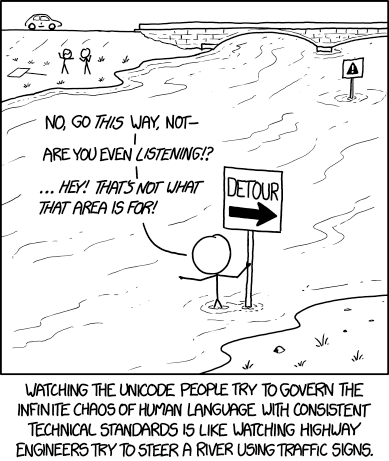I’ve been thinking about languages a lot lately.
Mostly the kind I encounter in my work, programming languages, but also human languages and the intersection between the two.
My thinking runs parallel to what I talked about bringing from my Drupal experience to my Salesforce work. I have been considering what I’ve taken from work on one programming language that made me better in others.
A few weeks ago I asked some friends in various professional circles about their thoughts on programming languages. “What’s your personal theory about learning new languages? Have you ever learned enough? How often should you learn a new one? How do you count languages you last used 5+ years ago? What’s reasonable to expect of other developers?”
The responses ranged widely, but generally all agreed we benefit from learning more languages throughout our careers, but particularly when we are starting out. Not surprisingly the clarity of thinking ranged as well with more experienced programmers being clear about the value they had taken from different languages they had used over time.
My Experience with Languages
During my first job after college Frank Weber, an AFSC volunteer who served as a mentor of mine, suggested that I should learn a new language every year. As I work with developers who are earlier in their career than I am, I have been trying to decide how important Frank’s advice was: I’ve settled on extremely important.

As a kid I was taught and learned a small number of languages like BASIC, Logo, and HyperTalk. In college, I learned several more including 8 in the course of a 16 week semester – a rough but useful experience. After college, when Frank told me to learn a language a year, I did that for several years. My career has largely centered around languages I taught myself basically on my own post-college.
As a result, at one point or another, I have written programs in more than 20 different programming languages. I can learn new languages quickly, in part because it is rare for me to encounter a language that has constructs I haven’t used previously. Along the way I discovered I can even help people use a language I don’t know just based on the patterns I know from other languages.
On the other hand, I have tried to learn three human languages in addition to English: French, Russian, and Spanish – all went terribly. And my inconsistent attempts to learn some ASL have fallen in the middle: I had some success, but never put in enough effort to learn it well.
That dichotomy makes it tempting to emphasize the differences between these two types of language. In ways they are very different. Human languages evolve naturally over time; machine languages have rigidly defined rules. Human languages try to help us express the full range of our experience; machine languages are designed to get a machine to do complete tasks.
But many concepts connect the two sets. Machine languages, like spoken languages, are tools created by people to express themselves. We label their structures as grammar in both, because we stole the formalization concepts from traditional languages when we invented programming languages. They both evolve over time. At this point they both borrow concepts from one another.
Growing Language Understanding
The thing that shifted for me recently was listening to a Hidden Brain episode Watch Your Mouth about human languages. The first section featured Lera Boroditsky talking about the impact spoken languages have on how people think. She cites examples of cultural understanding of ideas around direction and gender. There are similar ideas about our emotions that are also linked with the language we use to describe our emotions.
That had very direct correlations to programming. Hearing those discussions catalyzed the thinking I was already doing.
How I see and solve a problem in code can vary greatly with the language and platform I’m using. A Python application running on a server can use a radically different approach from a solution built in Apex on Salesforce. JavaScript running in a browser requires different solutions and details from solving that same problem in JavaScript running in a Node environment. Java largely frees you of worrying about memory handling, while many languages in the C-family force you to consider the storage implications of nearly every byte. At times when trying to work through a problem in one framework it can help think of how I’d solve it in another better suited to the task.
The second half of the Watch Your Mouth episode included a discussion of how languages change over time. It’s an interview with Linguist John McWhorter, and his work at looking at how language changes over time. He pushes back on the notion that we should all use the version of English someone tried to teach us in school:
“It’s a matter of fashion, pure and simple. People do need to be taught what the socially acceptable forms are. But what we should teach is not that the good way is logical and the way that you’re comfortable doing it is illogical. It should just be, here is the natural way, then there’s some things that you’re supposed to do in public because that’s the way it is, whether it’s fair or not.“
John McWhorter
Programming languages have fashions and patterns – and they are rarely fair. A new language like Go will become popular in part because it’s new and used by a popular company. An older language will go out of fashion like C++ or Java, because newer languages feel more graceful even if there are technical trade-offs for that grace. They evolve, more formally than English but less formally than people pretend. Just because there is a standards committee does not mean that committee is purely selecting the “best” solution.
Technical Intersections Between Languages
There is also a point where all these languages intersect: Unicode. Unicode tries to give us ways to express human languages in machine form – all written language. Every developer should understand how language is stored in files because our code is stored in that format, our servers talk to each other in that format, and humans will express themselves to our applications in that format.
My Theory on Programming Language Acquisition
Like plumbers, electricians, doctors, nurses, and really anyone with a career: Developers need to master the tools and techniques of their trade. Programming languages are tools, and the techniques we learn from one make us better in another. We do not have to like the language designs we encounter, but we need to understand them.
Every developer should teach themself a new language on a regular basis, either for work or for their own education. We should pick languages that are uncomfortable to us. Some should be new and popular, some should be old and foundational.
So if you’re a developer, go learn a new language. If you’re not a developer, go learn something different from what you use every day. It’ll force you out of your comfort zone and get you to learn more than you expect.
Languages I’ve written one or more programs in:
Just for fun, here’s the list of languages I can remember writing something substantive in:
- C
- C++
- C#
- Objective-C
- Python
- Ruby (with and without Rails)
- Java
- JavaScript
- PHP (versions 3-8, which only have passing resemblance to each other)
- ASP
- Logo
- BASIC (for Apple ][, and DEC Rainbow)
- VisualBasic
- VB.Net
- VBScript
- VBA
- HyperTalk
- AppleScipt
- Apex
- R
- Scheme
- Haskel
- Perl
- Prolog
- SQL, T-SQL, SOQL, and SOSL (sure arguably not languages which is why different flavors are listed as one)
- HTML/CSS (together they are mostly Turing complete, so arguably counts)
- XML/XSLT



One thought on “Thinking About Languages”